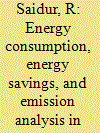| Srl | Item |
| 1 |
ID:
091697


|
|
|
|
|
| Publication |
2009.
|
| Summary/Abstract |
This paper is concerned with the estimation of energy use in office buildings in Malaysia and with the energy use of major equipment. Energy intensity (EI) - a measure of a building's energy performance - is estimated for Malaysia and compared with a number of selected countries. Air conditioners are shown to be the major energy users (57%) in office buildings, followed by lighting (19%), lifts and pumps (18%) and other equipment (6%). It is estimated that 77,569 MWh of energy can be saved and a huge reduction of emissions achieved through the application of advance glazing, compact fluorescent lamps (CFL), insulation, housekeeping, and by raising thermostat set point temperature of air conditioners, and reducing EI.
|
|
|
|
|
|
|
|
|
|
|
|
|
|
|
|
| 2 |
ID:
109417


|
|
|
|
|
| Publication |
2011.
|
| Summary/Abstract |
Although office market actors in the United Kingdom show a growing interest in energy efficiency, the pace of takeup of energy efficient office features is slow. Previous studies have highlighted the roles of limited direct financial costs and benefits ('efficiency gaps') and market barriers in limiting the rate of technology adoption. This study provides further evidence on the importance of these factors, but the primary contribution is focused on the role of corporate reputation and on the importance of individuals' values in shaping corporate behaviour. The paper presents a theoretical framework to explain environmental decision making in firms and we present qualitative evidence drawing from sixteen semi-structured individual and group interviews with office market stakeholders in London, Glasgow and Edinburgh. The research finds that companies, despite gradually becoming more energy conscious, still regard energy costs as a negligible part of their business costs. Nevertheless, an increasingly important driver is the reputational gain obtained by corporate businesses implementing sustainable practices. All the interviewees agreed that the pace of change in the office market is slow and that only further policy interventions will accelerate it.
|
|
|
|
|
|
|
|
|
|
|
|
|
|
|
|